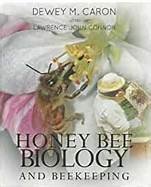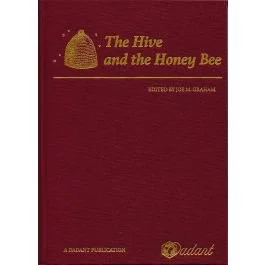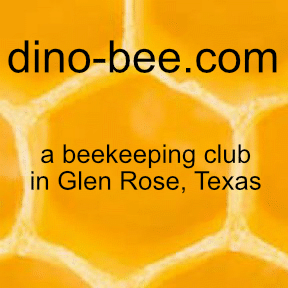Three Books Every Beekeeper Should Own
/Every time I have a problem with my bees, I turn to the Big Three – my three favorite beekeeping books. More often than not, one will point me in the right direction. So without further adieu, here are my picks for the three books every beekeeper should own.
Honey Bee Biology and Beekeeping
2013 Revision, Caron, Dewey with
Lawrence John Connor. Wicwas Press.
SRP (Betterbee) $57.95
Here is the book every new beekeeper should get. The author - Dr. Dewey Caron is a giant in the beekeeping world. He is an author (8 books), teacher, and emeritus professor of entomology at the University of Delaware. He’s also a long-time beekeeper.
As you might guess from the title, Honey Bee Biology is neatly divided in two parts. Chapters 1 through 10 describe honey bee biology - Anatomy, Dance Language, Pheromone Communication, etc. The rest of the book is nothing less than a roadmap of practical beekeeping covering “Spring Management”, “Fall and Winter in the Beehive”, “Honey Harvest” and more. The book is hard to put down because every chapter is well written, understandable, and easy to read.
The Hive and The Honey Bee
2015 Edition. Graham, Joe M (ed). Dadant
SRP (Dadant): $56.15
This book has a long, impressive history. It began in 1853 when Lorenzo Langstroth (yes, THAT Langstroth) wrote “Langstroth on the Hive and the Honeybee.” In 1885 Langstroth was not well, and he entrusted rewriting his book to Charles Dadant (yes, THAT Dadant). A new version was published in 1889. Over the next 50 years, revisions and rewrites were made. Around WWII a great grandson of Charles Dadant took the book in a new direction. It became a multi-author encyclopedia of beekeeping knowledge with each chapter written by beekeeping scientists and experts. This new and ambitious edition called The Hive and the Honey Bee was published in 1946. Major revisions and rewrites continue to be published. The current edition is 2015.
It is difficult to imagine a more complete work on beekeeping. The Hive should be considered a reference work, since the book has a total of 1057 pages. Experts write chapters and provide an extensive bibliography. Content runs the gamut – from the historic (“The World’s Beekeeping – Past and Present”), to the scientific (“Honey Bee Sociogenomics”), to operational (“Wintering Management of Honey Bee Colonies”).
Another plus is the illustrations. The 2015 edition is the first rewrite to include color photographs and graphics. The “Anatomy of the Honey Bee” chapter has plenty of fascinating electron micrographs. Personally, the electron microscope shot of a worker bee stinger gives me the willies.
Honey Bee Diseases & Pests
Third Edition (2013, 2nd printing 2015). Pernal, Stephen F.; Clay, Heather (Eds).
Canadian Association of Professional Apiculturists
SRP (Dadant) $18.50
Mites, viruses, microsporidians, louses, beetles, fungi, bacteria, spores – all want to attack our bees!!! What’s a poor beekeeper to do? One thing is certain when problems occur we need rapid, accurate diagnosis and an effective response. Honey Bee Diseases and Pests is organized with these necessities in mind.
Expert authors cover bacterial, fungal and viral diseases as well as parasitic mites, insect pests, animal pest/predators and other colony problems. When applicable, for each disease and pest, there is a clear description of Life Cycle, Impacts, and Controls. Color photos of symptoms and pests are very well done.
The “Diagnostic Table of Honey Bee Disease” toward the end of the book is a quick-look cross reference symptoms and possible causes.
DOES READING ALL THESE BOOKS MAKE ME A BETTER BEEKEEPER?
Good question. In the age Google, Youtube, TicTok, etc. , the world seems addicted to immediacy. So why buy books?
Books certainly have their downsides (e.g. big, bulky, not free, space taker-uppers). And we all know every beekeeping book out there will have some outdated information. Not surprising because science continually makes new discoveries. That’s how science works. Does this devalue a good beekeeping book? Not by a long shot.
Book publishers stake their reputations (not to mention significant amounts of money) on the quality and accuracy of their products. They like authors to be credentialed, recognized experts; and they like content to be evidence based and accurate – often times based on peer-reviewed science and edited by other experts. On the other hand…
A second year beekeeper with a Youtube channel does not an expert make. Anyone can say anything on an Internet blog, video, forum, comment, etc. regardless of how ridiculous and inaccurate. I won’t get my dander up by ranting about beekeeping misinformation on the Internet.
Don’t get me wrong.I am not saying ignore Internet based information.I use it all the time.Just be careful what you believe.As we know all too well, there’s a lot of garbage floating around out there in the ether.







